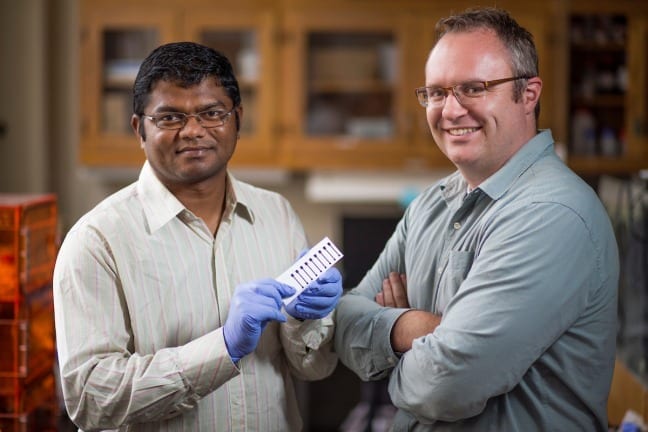
Researchers have invented a cheap, portable, microchip-based test for diagnosing type-1 diabetes that could speed up diagnosis and enable studies of how the disease develops.
An inexpensive, portable, microchip-based test for diagnosing type-1 diabetes could improve patient care worldwide and help researchers better understand the disease, according to the device’s inventors at the Stanford University School of Medicine.
Described in a paper published online July 13 inNature Medicine, the test employs nanotechnology to detect type-1 diabetes outside hospital settings. The handheld microchips distinguish between the two main forms of diabetes mellitus, which are both characterized by high blood-sugar levels but have different causes and treatments. Until now, making the distinction has required a slow, expensive test available only in sophisticated health-care settings. The researchers are seeking Food and Drug Administration approval of the device.
“With the new test, not only do we anticipate being able to diagnose diabetes more efficiently and more broadly, we will also understand diabetes better — both the natural history and how new therapies impact the body,” said Brian Feldman, MD, PhD, assistant professor of pediatric endocrinology and the Bechtel Endowed Faculty Scholar in Pediatric Translational Medicine. Feldman, the senior author of the paper, is also a pediatric endocrinologist at Lucile Packard Children’s Hospital Stanford.
Better testing is needed because recent changes in who gets each form of the disease have made it risky to categorize patients based on their age, ethnicity or weight, as was common in the past, and also because of growing evidence that early, aggressive treatment of type-1 diabetes improves patients’ long-term prognoses.
Read more . . .
The Latest on: Diabetes
[google_news title=”” keyword=”Diabetes” num_posts=”10″ blurb_length=”0″ show_thumb=”left”]
via Google News
The Latest on: Diabetes
- Missing link between diet and cancer risk uncovered as diabetes damages DNAon May 7, 2024 at 1:45 pm
When high blood sugar is present, particularly in conditions like diabetes, MGO can accumulate and damage the DNA and proteins. The study found that MGO can temporarily stop the BRCA2 gene which allow cancer-causing mutations to occur. The effect was observed in noncancerous cells, human breast cancer samples and mouse models of pancreatic cancer.
- Do People With Diabetes Need to Fast Longer Before Surgery?on May 6, 2024 at 6:01 am
New data find gastric contents after fasting aren't higher than nondiabetics, but an expert endocrinologist disputes that conclusion and GLP-1 agonists further complicate the picture.
via Bing News










